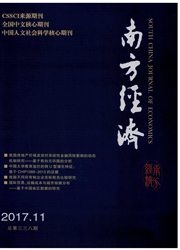

 中文摘要:
中文摘要:
本文将传统全要素生产率测算中对劳动力人数的考量转为对人力资本总量的考量,利用最新的人力资本研究结果,重新测算了我国1983-2011年各要素对经济增长的贡献。结果显示,1983-2011年,物质资本积累对经济增长的贡献仍然最大,占48.7%,其次为人力资本总量增长的贡献,为31.0%,而TFP增长的贡献最小,仅占20.3%。在人力资本总量的贡献中,劳动力数量和质量的贡献分别占27.1%和72.9%,且质量的贡献在不断增加。在未来我国劳动力数量可能持续减少的宏观背景下,劳动力质量的持续上升对推动中国经济增长具有重要意义。
 英文摘要:
英文摘要:
Utilizing the latest research on human capital stock,this paper takes the role of human capital instead of labor quantity into consideration and re-estimates China's TFP(Total Factor Productivity)for the period from 1983 to 2011.The result shows that the contribution of physical capital growth to economic growth,which is on average 48.7%,remains the largest.Human capital and TFP growth contribute 31%and 20.3%of economic growth,respectively.About 27%of the human capital contribution comes from labor quantity growth,and labor quality growth contributes the remaining 73%,which is still growing.Since labor quantity will likely decline in the future,labor quality growth will be an important driving force for China's economic growth.
 同期刊论文项目
同期刊论文项目
 同项目期刊论文
同项目期刊论文
 期刊信息
期刊信息
